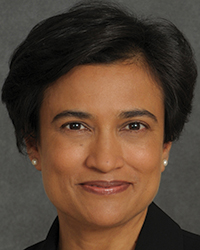Presidential Column
Finding Our Fundamentals

Photo credit: Jeanne Neville
I want to really understand the fundamentals of programming.
-Masako Wakamiya
Curious to know who Masako Wakamiya is? After retiring from her job as a bank clerk in Japan, Masako Wakamiya decided to learn programming and, at age 82, is now the world’s oldest app developer. Her app creation, a game called Hinadan, earned her a recent invitation to Apple’s prestigious Worldwide Developers Conference, as well as an introduction to Apple CEO Tim Cook.
Wakamiya’s success is just one of many inspiring examples that caught my recent attention. I also see it in a sport I love, tennis. Since bursting on the professional tennis scene 20 years ago, the Williams sisters, Serena and Venus, continue to dominate the game by adapting to new playing styles and a fresh crop of opponents. With a staggering haul of 30 singles Grand Slam championships between them, they remain trailblazers, redefining athleticism and accomplishment.
How do they all do it? There is rarely a single answer, but the ones that stand out for me are curiosity and the drive to learn, improve, and change.
This got me thinking about academic life. Being curious and being willing to learn, improve, and change are essential elements of any college experience. And these elements also characterize the process of teaching and research. Curiosity helps redirect the questions to ask, learn new methodology and analyses, change the way one writes, choose the different conferences to attend, catch talks outside one’s own specific area, seek collaborators who have different expertise, and so on. The list is long and fun. As I look back, I realize that these opportunities in academia have helped me dig deep into questions that go from an inward study of how memory works by testing the explicit versus implicit nature of memory to exploring the social transmission of memory.
But I reach out not just to students who are contemplating teaching and research careers. A majority of you might not continue in academia. Instead, you will take your all-around training in psychological science to a number of different applied settings, and as you make this transition, formal infrastructures of learning and teaching would likely disappear. Yet it becomes quickly obvious that there is learning involved everywhere and there is a need to constantly reinvent oneself in these times. Staying curious and being willing to learn and change might just be the key to remaining motivated, improving, and above all, continuously enjoying it all from the very start and for the long haul.
In her absolutely fascinating Inside the Psychologist’s Studio video interview recorded at the 2012 APS Convention, Professor Brenda Milner, the pioneering neuroscientist and an iconic inspiration, advises students and budding scientists on the importance of being willing to change directions so as to play to one’s strengths. One can imagine that for Masako Wakamiya this meant the need to understand the fundamentals of programming. Equipped with a lively curiosity and a willingness to learn, you will keep finding your new fundamentals well after your college life, whether in academia or beyond.
One final note: If you’re interested in learning what our science has to say about curiosity, check out this collection of articles on APS’s “Research Topics” page.




